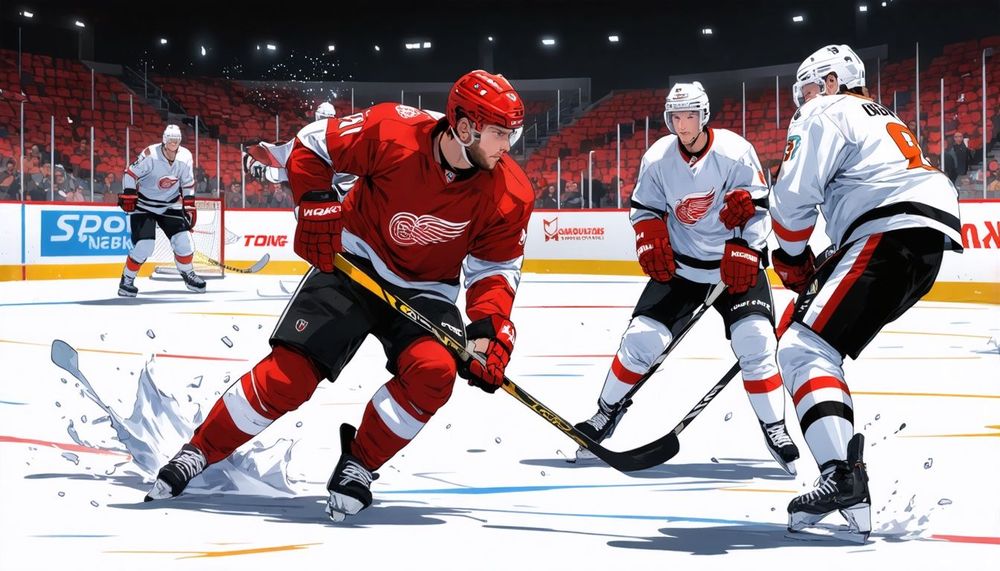The Pressure of Stanley Cup Aspirations: Analyzing NHL Teams Facing Transition

In the National Hockey League (NHL), pressure manifests differently for each team. While some organizations focus their efforts on improvement with an eye toward the playoffs, others find themselves bearing the considerable weight of expectation to win the Stanley Cup. The stakes are high, and the urgency varies among teams. The Florida Panthers, for instance, have reached the Stanley Cup Final in recent years with an impressive display, making their victories appear somewhat effortless last season. However, the journey to the championship is rarely simple and poses particularly challenging conversations for teams unable to achieve their goals, especially as seasons accumulate without success. Today, attention turns to teams that may need to consider substantial changes to their rosters following continued disappointments.
One such team is the Toronto Maple Leafs, who if they fall short in the postseason once again will face difficult questions regarding their future. The departure of Mitch Marner during the summer indicated a lack of willingness to re-sign with his hometown team, creating a significant void as he was considered a top-10 player in the league. Despite retaining talents such as Auston Matthews, William Nylander, and re-signing John Tavares, a significant number of questions remain for the team. The aging defense corps has raised concerns about its ability to perform at a high level, particularly regarding Morgan Rielly's capacity to step up as the primary defenseman. Moreover, the health and performance of goaltenders Joseph Woll and Anthony Stolarz will be critical as the season unfolds. General Manager Brad Treliving has indicated through personnel changes that he aims to cultivate a more physical playing style to compete with teams like Florida, Ottawa, and Montreal. Should these strategies fail, fans may once again be left wondering what adjustments should be made moving forward, necessitating a reevaluation of the team's approach.
The New York Rangers, another team in the discussion, have already initiated a transformation that some perceived to start last season. Owner James Dolan is unlikely to remain passive during challenging periods, as the urgency to win the Stanley Cup is palpable. Following a series of trades, such as those involving Chris Kreider and K'Andre Miller, the focus has shifted towards reallocating resources to enhance their roster. The Rangers are now led by new head coach Mike Sullivan, whose track record suggests potential for success with key players like Mika Zibanejad, Artemi Panarin, Adam Fox, Alexis Lafrenière, and Vincent Trocheck at their disposal. The presence of elite goaltender Igor Shesterkin ensures that the Rangers maintain competitive chances, particularly if they secure a playoff berth. However, the specter of Panarin's impending free agency next summer looms large, and failure to secure the Cup or even qualify for the playoffs could prompt a major overhaul of the roster.
The Los Angeles Kings face their own set of challenges, having been thwarted by their playoff rivals, the Edmonton Oilers, for the past four consecutive seasons. Recent management changes, including the departure of General Manager Rob Blake and the hiring of Ken Holland, reflect a need to adapt. Holland's commitment to bolstering the team's defensive capabilities is evident in the acquisitions of veterans Cody Ceci and Brian Dumoulin. While the Kings boast a strong group of young players, including Quinton Byfield, Brandt Clark, Alex Laferriere, and Alex Turcotte, the transition of leadership from the seasoned veterans like Anze Kopitar and Drew Doughty is yet to occur. If the Kings' veteran core struggles or if they are eliminated by the Oilers once again, it may prompt the franchise to consider trading away more experienced players for the sake of long-term development.
Turning to the Washington Capitals, reactions to their approach in free agency last year sparked differing perspectives. Some observers viewed their signings as a desperate attempt to extend their competitive window while ensuring Alex Ovechkin had sufficient support in his quest for another playoff run. Conversely, some analysts perceived these moves as a means of harnessing the positive momentum gained from a recent playoff appearance. The acquisition of Jakob Chychrun aimed to enhance the defensive lineup alongside John Carlson. As a result of these strategic additions, the Capitals enjoyed a remarkable regular season and stood as the best team in the Eastern Conference. Ovechkin's commitment to playing in D.C. for as long as he desires is a positive factor, and the guidance of coach Spencer Carbery could ease the transition. However, planning for the franchise's future without Ovechkin must commence soon. Should the Capitals fail to replicate their previous year's success and advance toward a deeper playoff run, the subsequent strategy to reshape the roster could become a far more complex undertaking.
The Dallas Stars present an intriguing case for the upcoming season, particularly in light of their recent coaching change. Following a disappointing outcome in the Western Conference Final for the third consecutive year, the Stars parted ways with coach Pete DeBoer. Their decision to bring back Glen Gulutzan, who previously coached the team from 2011 to 2013, suggests a desire to reignite a winning atmosphere. A key narrative for Dallas is the future of Jason Robertson, an elite scoring forward approaching restricted free agency next summer, and the possibility of becoming an unrestricted free agent beyond that. Given the substantial contracts already tied to other key players, the team faces critical financial decision-making. In the event of another playoff exit, the potential for trading Robertson could be a pivotal moment for the franchise, although this would not be categorized as a complete rebuild. The organization would still retain a competitive edge while navigating the implications of roster changes.
The Edmonton Oilers, clearly operating under a 'win-now' mentality, find themselves at a significant crossroads following near misses in the playoffs. After falling short in a heartbreaking seven-game series against Florida in the 2024 playoffs, the Oilers must contend with the perceived deficiencies within their roster. The preceding summer’s quick exit after losing to the Panthers highlighted weaknesses that could be compounded by competition from formidable opponents, including the Kings and Stars. As the organization enters a new season, speculation surrounds Connor McDavid's future with the team. Should the Oilers underperform and fail to secure a Stanley Cup victory, McDavid's decision not to extend his contract might prompt substantial changes to the roster, potentially prompting a drastic reconfiguration of the team.






